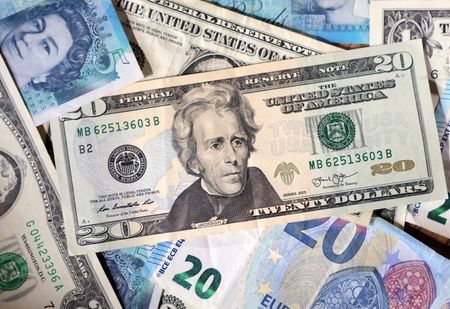By Caroline Valetkevitch and Alun John
NEW YORK/LONDON (Reuters) -Major stock indexes were mixed with U.S. stocks easing on Tuesday, while U.S. Treasury yields rose as investors focused on a critical vote in Washington over U.S. President Donald Trump’s sweeping tax cuts.
Trump went to Capitol Hill on Tuesday to encourage Republican lawmakers to resolve their differences over a bill that would extend the 2017 tax cuts from Trump’s first term, among other things.
Investors are worried the bill will grow the U.S. budget deficit at a faster pace than previously expected.
Moody’s Investors Service downgraded the U.S. credit rating late on Friday, fanning concerns about the U.S. debt load.
“With the Republican bill still up in the air, there’s just enough uncertainty to lead people to be a little bit more cautious and use this recent rally maybe to trim a little bit of their (stocks) portfolio,” said Rick Meckler, partner at Cherry Lane Investments, a family investment office in New Vernon, New Jersey.
The S&P 500 on Monday registered a sixth straight day of gains.
Investors also awaited commentary from Federal Reserve officials, with traders currently expecting at least two 25-basis-point rate cuts from the Fed by the end of 2025.
The Dow Jones Industrial Average fell 74.64 points, or 0.17%, to 42,717.94, the S&P 500 fell 13.78 points, or 0.23%, to 5,950.01 and the Nasdaq Composite fell 64.75 points, or 0.34%, to 19,150.81.
Home Depot was down 0.1% with the broader market, although the home improvement retailer beat Wall Street estimates for first-quarter sales.
European stocks edged higher, with utilities and telecom firms leading gains.
MSCI’s gauge of stocks across the globe rose 0.11 points, or 0.01%, to 882.50. The pan-European STOXX 600 index rose 0.68%, while Europe’s broad FTSEurofirst 300 index rose 14.86 points, or 0.68%. Germany’s DAX hit a record high.
China’s blue-chip index climbed 0.54% after its central bank cut benchmark lending rates for the first time since October.
The yield on benchmark U.S. 10-year notes rose 1.2 basis points to 4.487%, from 4.475% late on Monday.
The 30-year bond yield gained 4 basis points to 4.981% after touching 5.037% on Monday, the highest since November 2023.
In a sign of broader market nervousness, Japanese super-long government bond yields soared to all-time highs on Tuesday, with the immediate precipitating factor a poor auction of 20-year securities. [JP/]
The Japanese 20-year yield < JP20YTN=JBTC> jumped as much as 15 bps to 2.555%, its highest since 2000, and the 30-year yield hit a record high of 3.14%.
The U.S. dollar declined again as investors awaited more comments from Fed officials.
In late morning trading, the dollar slipped against the yen, falling to a roughly two-week low of 144.095 yen. It was last down 0.1% at 144.64 yen, sliding in five of the last six sessions.
The Australian dollar fell sharply against the U.S. dollar after the Reserve Bank of Australia cut benchmark interest rates by 25 basis points and left the door open to further easing in the months ahead. The Aussie was last down 0.9% at US$0.6401.
On the inflation front, Canada’s annual inflation rate eased to 1.7% in April, above economists’ expectations for a 1.6% gain. Two of the three core measures of inflation, which are closely watched by the Bank of Canada, also hit 13-month highs on underlying price pressures.
U.S. crude fell 0.69% to $62.26 a barrel and Brent fell to $65.11 per barrel, down 0.66% on the day.
Spot gold rose 0.42% to $3,243.21 an ounce.
(Reporting by Caroline Valetkevitch in New York and Alun John in London; Additional reporting by Ankur Banerjee and Johann M. Cherian in Singapore; Editing by Lincoln Feast, Tomasz Janowski, Emelia Sithole-Matarise and Joe Bavier)









